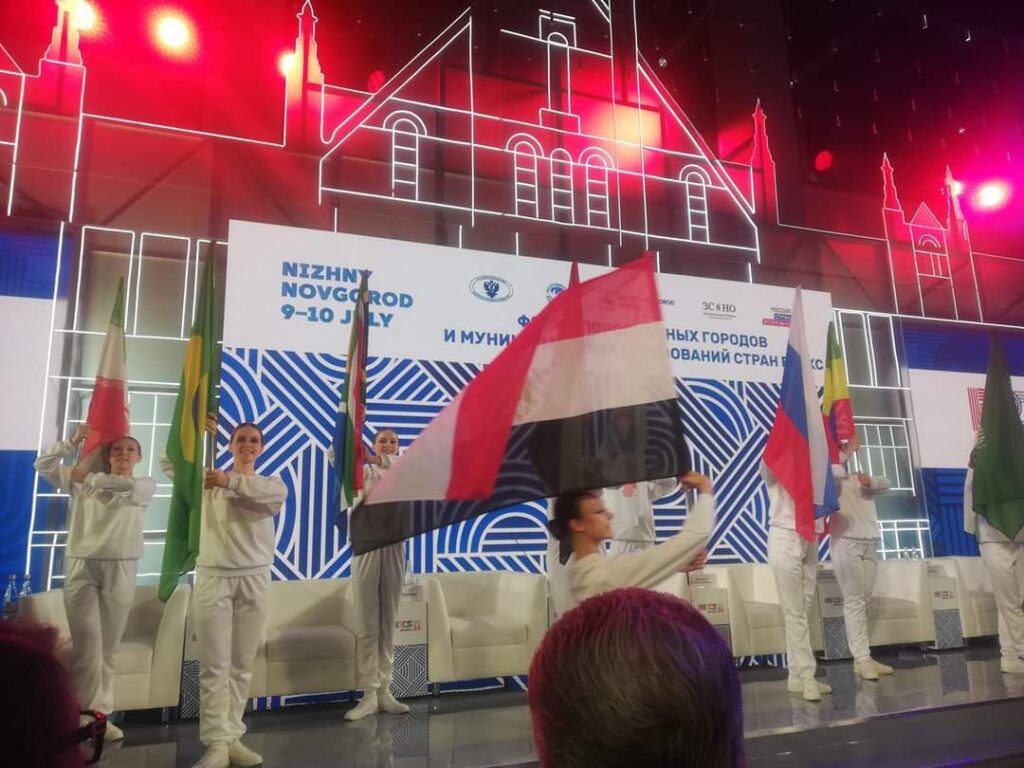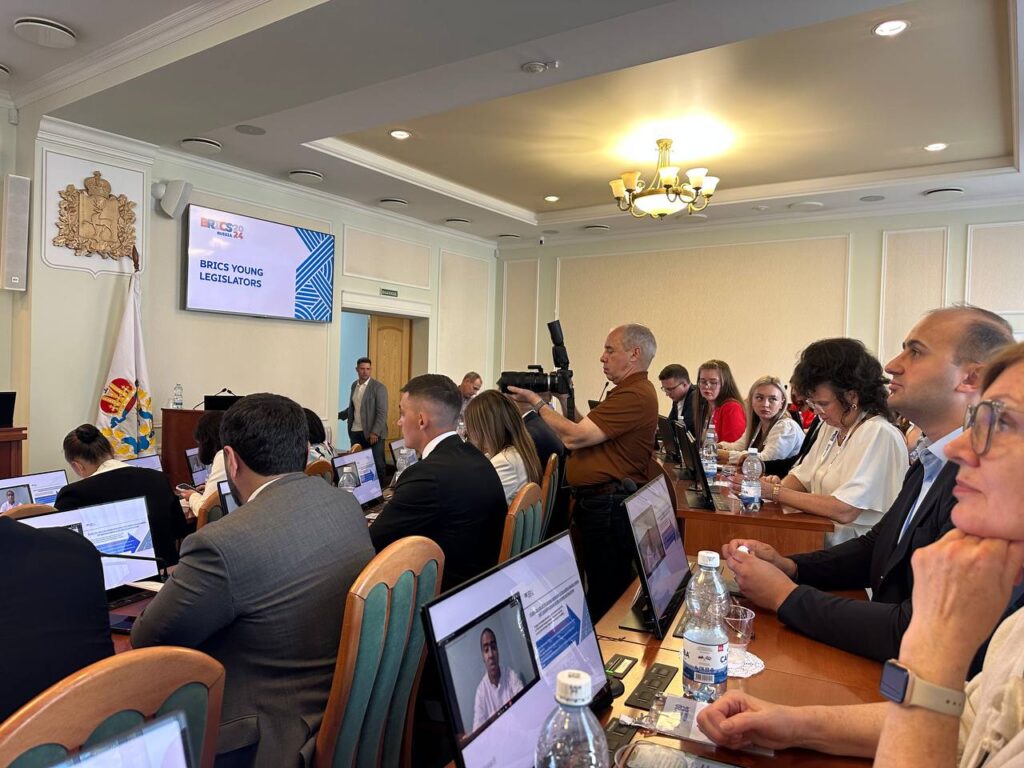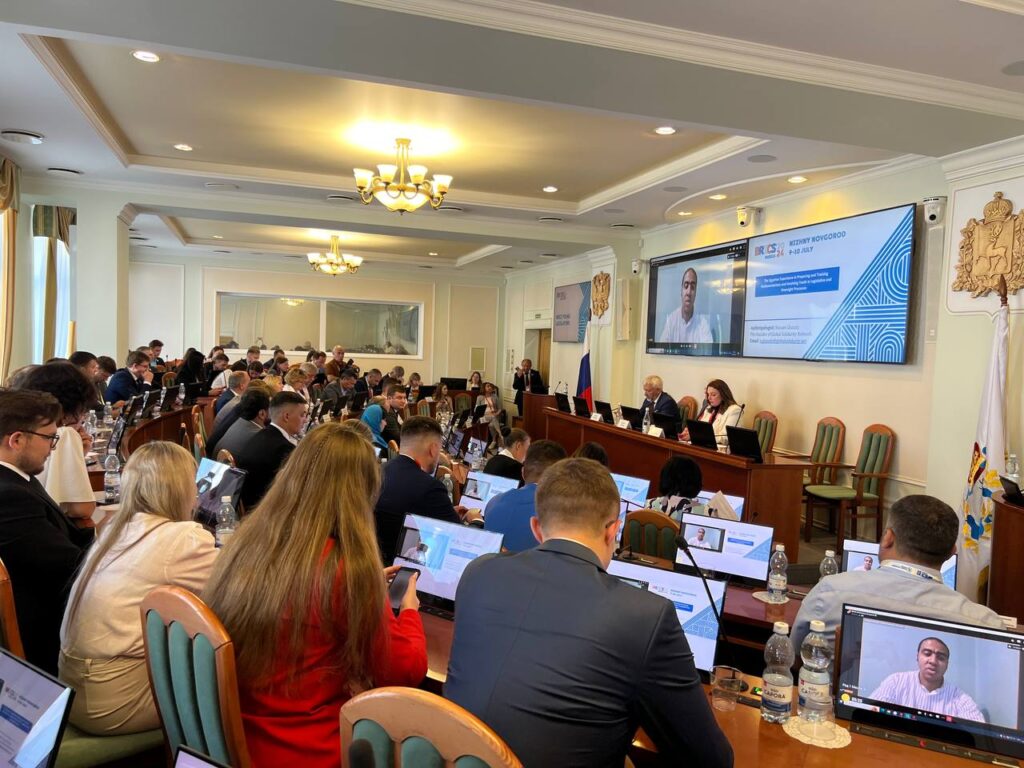International activist and anthropologist Hassan Ghazaly, founder of the World Solidarity Network, participated as a keynote speaker representing the Arab Republic of Egypt with a presentation entitled "The Egyptian experience of preparing and training MPs and engaging young people in legislative processes" at the "BRICS Young Legislators" Forum organized by the Novgorod Regional Legislative Assembly as part of the "Twinning BRICS Cities and Municipalities" Forum.
The forum was inaugurated by Russian Foreign Minister Sergei Lavrov, who in his opening speech welcomed the fact that this year's forum was being held in the Novgorod region, known for its rich history and great hospitality. Lavrov stressed that the region, like Russia as a whole, was demonstrating its openness to the world and its willingness to develop foreign relations based on the principles of respect, equality and mutual interest.

Lavrov also mentioned that Russia, chairing the BRICS this year, is working to strengthen the overall strategic partnership within the association, giving particular priority to humanitarian cooperation and people-to-people communications. He added that interaction between cities and municipalities plays an important role in these efforts. He asserted that the forum has become an effective platform for developing dialogue between regional and local authorities, leading to twinning arrangements between several of them. He pointed out that the accession of new members to the BRICS at the beginning of the year has increased the capacity of this mechanism, offering new opportunities for the exchange of experience in various aspects of urban life. Lavrov expressed the hope that the forum would take place in a working and friendly atmosphere, fostering useful contacts and discussion of promising joint projects, as well as strengthening friendship and trust between the BRICS countries.

The meeting was attended by a range of eminent speakers, including Gleb Nikitin, Governor of the Novgorod Region, Yevgeny Primakov, Head of the Rossotrudnichestvo Agency, and M. Ioulène Evgueni Borissovitch, coordinator of the Assembly of Legislative Bodies of Governmental Authorities of the Regions of the Russian Federation, as well as Foad Gina, general director of the Center for Development and Excellence of African Youth, Mrs. Tatiana Orjoumtsieva, director of the Russian Cultural Center in Beijing, and Raymond Matlala, president of the BRICS Youth Organization in South Africa (SABYA), with the participation of representatives of BRICS countries.
For his part, Hassan Ghazaly highlighted the growing role of young people in the political and legislative decision-making process at national and local levels in Egypt. He said, "The current Egyptian parliament has the largest number of young deputies who actively participate in the discussion of laws and policies, while the House of Representatives has a main committee dedicated to youth and sports issues, chaired by MP Mahmoud Hussein, a former member of the Youth Parliament simulation model and current member of the Egyptian parliament, testifying to the effectiveness of the executive preparation activities organized by the state authorities, as the Egyptian Minister of Youth always affirms."
Ghazaly highlighted the work of the World Solidarity Network to encourage youth participation through national projects and initiatives, including the National School for Executive Training (Needs), aimed at training students free of charge in languages (English, Russian, French, Swahili, Spanish) to prepare them as international ambassadors and leaders believing in the values of global solidarity, for effective participation in the international community through their linguistic communication skills, using technologies facilitating international communication between peoples.

Ghazali also spoke of Egypt's efforts to empower young people through various state institutions, including the Ministry of Youth and Sports, the most important institution targeting the general public, particularly through youth centers, playing an important role through a wide range of activities aimed at developing young people and encouraging them to participate in the community, of which he was fortunate enough to belong, which helped shape his intellectual side. In addition to the simulation models of the Egyptian Parliament and the Egyptian Shura Council, which are platforms for training young people in leadership skills, governance and transparency, as well as the youth clubs and associations recently organized in the form of a sectoral union of youth entities.
Ghazali also emphasized the vital role of Egyptian non-governmental organizations and international youth movements, such as the Mouvement des Jeunes Nasséristes Internationaux and the Fondation de la Jeunesse Méditerranéenne, in providing real opportunities for cultural exchange.
He also highlighted the role of the Académie Nationale de Formation des Jeunes Leaders, which works to empower young people from all backgrounds, particularly women, and to integrate them into development programs, taking into account geographical representation on a national scale.
Speakers addressed a number of crucial topics, ranging from international youth cooperation, the system of interaction between BRICS youth parliamentary structures, the development of youth parliaments and best practices in different BRICS countries, to the administration training strategy in the People's Republic of China. They also discussed the experiences of youth parliaments in BRICS countries, including youth participation in BRICS legislative processes: a case study from South Africa, and the participation of the Chamber of Young Legislators in law-making in Russia.
The meeting ended with a discussion on the role of universities in shaping the administrative skills of young leaders, and ways of strengthening the concepts of solidarity as a driving force behind youth policy in the BRICS countries.
It should be noted that this forum was part of the preparations for the BRICS Parliaments Forum, which began on Wednesday July 10 in St. Petersburg, Russia, and will continue until July 13, with the participation of the presidents of the parliaments of the "BRICS" economic group countries and representatives of various member countries, led by the Speaker of the Egyptian House of Representatives, Councillor Dr. Hanafi Gebali, with the aim of strengthening cooperation and parliamentary exchanges between the group's member countries.
President Putin said that the current theme of the forum is the role of parliaments in promoting multilateralism for equitable development and global security, a very important issue that requires highlighting the nature of the fundamental global transformations our planet is undergoing today.
The President stressed that open discussions and direct dialogues between peoples' representatives fully reflect the principles of the 'BRICS' organization, taking into account the interests of others, committing to democracy in international relations, respecting sovereignty and the right to independent development for all. He added that parliamentary dialogue today, particularly within the framework of the 'BRICS' group, has become more important than ever, with parliamentarians voicing the demands and needs of millions of people as defenders of their peoples' will and their political and national rights, helping to strengthen global democracy.







